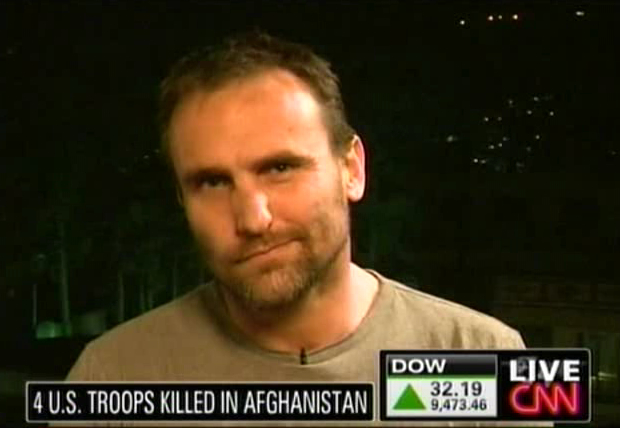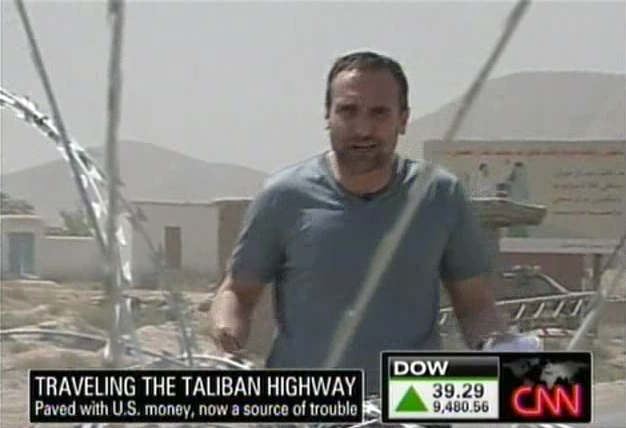NR: "...eight years on and what is there to show for it? "

Length: 3:04
LARGE (35.4 MB) ----- SMALL (3.7 MB)
Michael talks to Kyra Phillips about the lack of progress in Afghanistan -- what is there to show for eight years of combat there? In the second hour of her program, another showing of the Highway #1 piece, but with a different beginning.
KYRA PHILLIPS: CNN's Michael Ware live in Kabul, Afghanistan.
You know, Michael, that's just a reminder there from our troops that this place is still home to the Taliban, and it's eight years later. And the military is putting up the same fight. You wonder, where is there progress?
MICHAEL WARE, CNN CORRESPONDENT: Well, that certainly is something I and ordinary Afghans are constantly wondering here on the ground in Afghanistan. As you say, eight years on and what is there to show for it?
Intensified combat. That's one thing to show. A more resilient, a stronger Taliban than ever. Another thing to show for it.
I've just returned from the southern capital of Kandahar, which is the birthplace of the Taliban. Now, that just neighbors the area of Helmand, the next-door province or state, where this massive U.S. military offensive is under way.
And I can tell you, what everyone in the region there is telling me -- police commanders, local warlords, tribal leaders, even the Afghan president's brother -- is that the fighting by the Americans might be killing Taliban foot soldiers, but it's doing nothing to break the back of the Taliban war machine.
And we see that the Taliban, in its pockets of resistance, has the capital of the south, Kandahar, this city of almost a million people, virtually surrounded. And the Taliban are able to strike almost at will.
So, I can tell you, this mission is certainly in crisis. This nation is in a political limbo. They don't even know the outcome of last month's presidential election, because there's been so many allegations of corruption.
PHILLIPS: So, Michael...
WARE: And the entire U.S. war plan is currently under revision -- Kyra.
PHILLIPS: So, bottom line, you know, basically I'm listening to you, and it sounds pretty darn depressing. So, I guess as an American here in the U.S., I'm wondering, if the Taliban is that strong, do I need to worry about another 9/11?
WARE: No. I really don't think you do, not -- certainly not coming from Afghanistan.
Now, let's keep this in mind. Why did America go to war in Afghanistan? Because it saw a national security threat directly posed to American interests. And that was coming from al Qaeda. Al Qaeda -- Osama bin Laden, Zawahiri, the No. 2 of al Qaeda, the al Qaeda leadership -- are not here in Afghanistan.
The bulk of this war, the vast majority of the shootings, the killings, the bombings, are being carried out by Afghan Taliban or Afghan fighters. They have never once launched a terrorist attack outside of Afghanistan.
So, the men who America is fighting right now are fighting to get America out of their country. They're not fighting to set up terrorist bases to launch another 9/11 -- Kyra.
PHILLIPS: Michael Ware, live from Kabul. Michael, thank you so much.

Length: 3:22
LARGE (39.0 MB) ----- SMALL (4.1 MB)
MICHAEL WARE, CNN CORRESPONDENT (voice-over): Afghanistan is hurting badly. Eight years after America's war began here, the combat continues with the death tolls among coalition soldiers, Afghan security forces and civilians ever rising.
Politically, it's little better, with the nation in limbo. The final results of last month's presidential election have been stalled by a storm of corruption allegations. But it wasn't meant to be this way.
Having turned its back on Afghanistan throughout the 1990s, once the Soviet army lost its war here, the United States has spent these eight years trying to make good on its past neglect. But true, undeniable success is hard to see.
(on camera) For most ordinary Afghans, this perhaps is the simplest, clearest measure of that. This is Highway Number 1. It's here that Kabul ends, and 300 miles down that road is Kandahar and the Taliban heartland.
I remember when taking the journey from Kandahar to Kabul was more than 12 exhausting hours, but in 2004 American aid money repaved this road and cut that down to a mere five or six. Now, that journey is back to nine or ten hours. There's at least three known Taliban checkpoints on this American-paved highway. People are being pulled off buses and executed by the Taliban.
(voice-over) Truck driver Mohammed Qasim runs this Taliban gauntlet once a week. He hauls fuel in this tanker. The road, he says, is in terrible shape, wrecked by explosions. Drivers are left completely exposed.
"It's been blown up by land mines and there is no security on it," he says. A father of three, Qasim has to provide for his children. He takes his life in his hands each time he travels Highway 1. "I'm compelled," he tells me. "How else do we eat? There's simply no alternative."
Highway 1 looks like this. It is one of the most vital arteries in Afghanistan, rebuilt with almost $300 million in American aid money. Its asphalt rolls out from the capital, Kabul, to the west towards Kandahar, the nation's second largest city and a political epicenter.
(on camera) And this is the other end of that road. Kandahar is just a short distance down there; Kabul, hundreds of miles that way. But here in Kandahar, this is a city surrounded by pockets of Taliban resistance. Indeed, just a few miles down that dirt road is a Taliban-controlled district. A few miles up the highway is the first Taliban checkpoint.
The fact that the Taliban's been able to strangle the life out of this highway is a testament to the fact that there's simply not enough American, British, international or Afghan troops to secure it. What had once been an American project, hailed as a sign of progress, has now become a mark of a mission in crisis.
Michael Ware, CNN, Kandahar.
